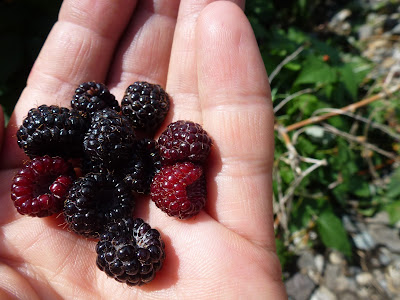Move over goji and acai berry! We have wild black raspberries here, and they are free, abundant, and packed with nutrition. By now it's mid July, and it's proving to be a very bountiful berry harvest this year! Currently, the black raspberries are in full production, growing wild along many ditches, park trails and roadways. They line our back fenceline in huge bushes - a wild weedy patch, yet abundant in fruit. We have have the pleasure of going out each morning for the past week to harvest huge bowls of berries for breakfast, with more than enough to stock up the freezer as well.
Tips for harvesting:
Black raspberry (Rubus occidentalis) is related to the red raspberry (Rubus ideus), is native to North America and grows wild in many locations, including urban areas like parks, trails, river banks, ditches, and other abandoned lands. The berries are ripe when deep dark red-black coloured, and should come off easily when plucked from the stem. The stems and stalks are prickly with little thorns, so some careful picking is necessary in order not to get scratched. But the slow careful picking is well worth it, as these black raspberries are amazing in luscious, rich flavour. Here is an interesting site to tell you about the differences between red and black raspberries, as well as how to differentiate between a black raspberry and a blackberry.
Why are black raspberries a superfood?
Black raspberries (as well as blackberries and red raspberries) are extremely high in antioxidants, meaning they offer multiple health benefits including cancer-fighting properties. The black raspberries specifically contain high levels of anthocyanins, which give them their
rich, dark color. Anthocyanins work as antioxidants that help fight free
radical damage in the body.
How to use:
Eat ripe berries warm off the plant! Feed to your kids! Get them to help you pick. Or freeze, dry or cook into jelly, jam, or syrup. The black raspberry leaves can also be used for herbal tea, either hot or iced. Steep a handful of fresh leaves (or 1-2 Tbsp dried) in 4 cups water that has just boiled for at least 10 minutes. Sweeten with honey or maple syrup, or add fresh mint leaves to the tea blend for additional flavour. All species of raspberry are medicinal, usually red or black raspberry is most common for women's tea (helps to regulate hormones, helps to tone uterus before labour and birthing, rich in minerals and calcium).







No comments:
Post a Comment